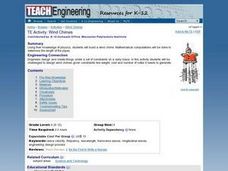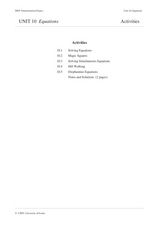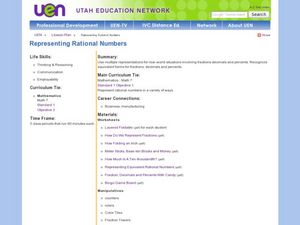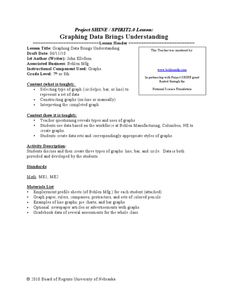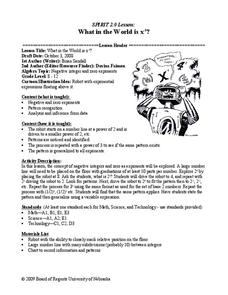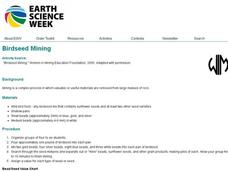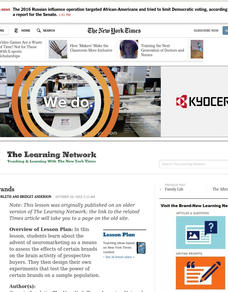Curated OER
Harry Potter Problem
In this middle/secondary mathematics worksheet, students solve a unit conversion riddle that is based on the monetary system of the wizards in Harry Potter. The one page worksheet contains one problem. Solution is provided.
Curated OER
Shopping Around
Third graders select a recipe and compare prices for ingredients at two different stores. They select the best place to buy the ingredients and answer questions about the process. They include their data on a spreadsheet related to their...
Curated OER
Prime and Composite Numbers
Fifth graders investigate the concepts of composite and prime numbers. They factor different numbers and determine the number of factors for each. Based upon this information the number is declared prime or composite.
Curated OER
Wind Chimes
Students construct wind chimes using physics. In small groups they design and create wind chimes using a specific weights, number of notes, and keeping the cost under ten dollars.
Curated OER
When One Beat Is Better Than Two
Fourth graders create an individualized wellness plan that addresses these controllable health risk factors:obesity, high cholesterol level, high blood pressure and inactivity.
Curated OER
Kid Garden Math
Students design a geometric garden. Shapes to be included are squares, triangles, and hexagons. After reading a book together about shapes, students get to use construction paper to cut out and design their own shape garden.
Curated OER
Magic Squares, Simultaneous Equations, Hill Walking, and Diophantine Equations
In this solving equations worksheet, 9th graders solve and complete 21 various types of problems. First, they use the method shown to find the value of xin each equation. Then, students use an algebraic approach to solve the magic...
Curated OER
A Walk on the West Side
Students comprehend what makes up the physical community. Read and construct scale drawings and models. Explore the history of infrastructures and how the contributions of science, math and industry have led to the development of their...
Curated OER
It's a Fact!
Second graders participate in a variety of activities to master addition and subtraction facts.
Curated OER
The Binary Counter Circuit
Students count from 0-99 using the binary number system. In this algebra activity, students problem solve by working with faulty circuits and applying their knowledge f Binary Numbers. They work in team to create a solution.
Curated OER
Using Slope Angles
In this geometry worksheet, 10th graders use right triangle trigonometry to solve problems involving angle of elevation or depression. The one page worksheet contains eleven problems. Answers are not provided.
Curated OER
Batchelder Bubble Gum Factory: Place Value Unit
Students explore grouping. In this math lesson, students brainstorm ways to efficiently count the items in their pile and discuss the methods used. Students use a place value chart and practice regrouping ones to tens.
Curated OER
Representing Rational Numbers
Seventh graders explore rational numbers. In this fractions, decimals, and percents instructional activity, 7th graders identify and compare equivalencies between fractions, decimals, and percents. Students use hands-on activities to...
Curated OER
One Hundred Hungry Ants
Primaries read the book One Hundred Hungry Ants and solve word problems based on the book. In this word problems lesson plan, students will be able to find the factors of a number by organizing counters into equal rows.
Curated OER
Graphing Data Brings Understanding
Students collect, graph and analyze data. In this statistics lesson, students use circle, pie, bar and lines to represent data. They analyze the data and make predictions bases on the scatter plots created.
Curated OER
Negative Exponents
Young scholars solve negative exponential functions. In this algebra lesson, students define the properties for rewriting functions with negative and zero exponents. They use a robot to create a visual of what is happening to the...
Virginia Department of Education
Analyzing and Interpreting Statistics
Use measures of variance to compare and analyze data sets. Pupils match histograms of data sets to their respective statistical measures. They then use calculated statistics to further analyze groups of data and use the results to make...
Curated OER
The 1 That Got Away
Students explore number properties. They using multilink blocks to explore doubling of the numbers and explore the patterns to investigate 2 to the power of n and how it is written. In addition, they usse the 100s board, number line and...
Curated OER
Geometric & Arithmetic Patterns
Eighth graders explore sequences. They discuss the difference between an arithmetic sequence and a geometric pattern. Students participate in workstation activities where they determine arithmetic or geometric patterns and predict the...
Curated OER
Birdseed Mining
Students explore the meaning of mining. In this Science/Math lesson, students engage in a small group activity to sort and calculate the value of seeds/beads. Additionally, they are made aware of environmental damages which will effect...
Curated OER
Order of Operations and Simplify
Eighth graders investigate a lesson using the Order of Operations. The lesson has good instructions to carry out the lesson. The language is user-friendly for the average educator. They also use a Math writing journal to integrate...
Curated OER
Different Ways to Count
Fourth graders investigate various number systems and ways of counting. In this various number systems and ways of counting lesson, 4th graders discuss number systems from around the world. Students practice counting using the Mayan,...
Curated OER
Oral Language in Mathematics
Third graders examine fractions by descriptively writing about them. For this number sense lesson, 3rd graders read number sentences and compare fractions based on their size. Students explain fractions to a friend by writing a friendly...
Curated OER
Brain Brands
Students explore the advent of neuromarketing as a means to assess the effects of certain brands on the brain activity of prospective buyers. They design their own experiments that test the power of certain brands on a sample population.





